SOUTHERN DELTA AQUARIID METEOR SHOWER: Earth is passing through a stream of debris from Comet 96P/Machholz, source of the annual Southern Delta Aquariid meteor shower. The shower's broad peak, centered on July 30th, is expected to produce a meteor every 4 or 5 minutes during the dark hours before local sunrise. Southern hemisphere observers are favored. [meteor radar]
FARSIDE SOLAR ACTIVITY: Solar activity has been low for more than a week. A pair of explosions on the farside of the sun have broken the quiet. During the late hours of July 29th, a southern magnetic filament and a northern sunspot erupted in quick succession, producing a pair of CMEs. The sunspot is circled in this full-sun UV image taken by the STEREO-SDO fleet on July 30th:
The active region is only 2-3 days away from rotating onto the Earthside of the sun. Its arrival could bring an uptick in Earth-directed solar activity. Or not. The ongoing solar maximum is prone to long spells of quiet, and it's not clear that the current quiet spell is really over. Solar flare alerts: text, voice.
Monitor the farside! Download the 3D Sun app for your smartphone and never miss a farside explosion.
Realtime Space Weather Photo Gallery
NACREOUS CLOUDS OVER TIERRA DEL FUEGO: On July 24th, about an hour after sunset, Gerardo Connon of Rio Grande city in Tierra del Fuego, Argentina, walked outside and witnessed a rare display of nacreous clouds. The colorful apparition was as bright as the street lights in the city below:
These clouds, also known as "mother of pearl clouds," form in the stratosphere far above the usual realm of weather. They are seldom seen, but when they are, the reports usually come from high-northern parts of our planet. This apparition over Tierra del Fuego was unusual indeed.
Atmospheric optics expert Les Cowley explains the special conditions required to create such a cloud: "Take an unusually cold lower stratosphere (15-25km high), use some gravity waves generated by high winds and storms in the troposphere to stir in some water vapour, and -- voilà! You get these clouds made of tiny ice crystals shining after sunset with unforgettably bright iridescent colors."
"The very special conditions make nacreous clouds a rare, high-latitude phenomenon. Scandinavia, Iceland and northern Canada are favourite places to see them. Sightings in the southern hemisphere are even more rare because there is so little land far enough south except for Antarctica."

Solar wind
speed: 362.6 km/sec
density: 2.0 protons/cm3
explanation | more data
Updated: Today at 1806 UT
X-ray Solar Flares
6-hr max: B7 1452 UT Jul30
24-hr: C1 0115 UT Jul30
explanation | more data
Updated: Today at: 1800 UT
![]()
Daily Sun: 30 July 13
Sunspot AR1800 on the SW limb has a beta-gamma magnetic field that harbors energy for M-class solar flares. Credit: SDO/HMI
![]()
Sunspot number: 97
What is the sunspot number?
Updated 30 Jul 2013
Spotless Days
Current Stretch: 0 days
2013 total: 0 days (0%)
2012 total: 0 days (0%)
2011 total: 2 days (<1%)
2010 total: 51 days (14%)
2009 total: 260 days (71%)
Since 2004: 821 days
Typical Solar Min: 486 days
Update 30 Jul 2013
The Radio Sun
10.7 cm flux: 112 sfu
explanation | more data
Updated 30 Jul 2013
![]()
Current Auroral Oval:
Switch to: Europe, USA, New Zealand, Antarctica
Credit: NOAA/POES
![]()
Planetary K-index
Now: Kp= 2 quiet
24-hr max: Kp= 2 quiet
explanation | more data
Interplanetary Mag. Field
Btotal: 5.9 nT
Bz: 2.7 nT south
explanation | more data
Updated: Today at 1640 UT
![]()
Coronal Holes: 30 Jul 13
Solar wind flowing from this coronal hole could brush against Earth's magnetic field on August 4-5. Credit: SDO/AIA.

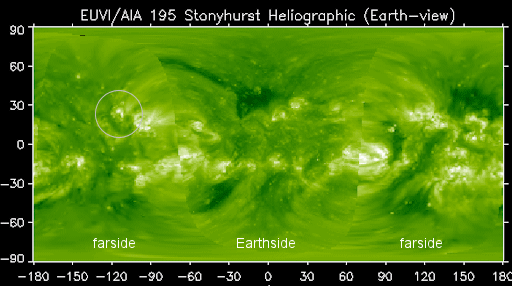
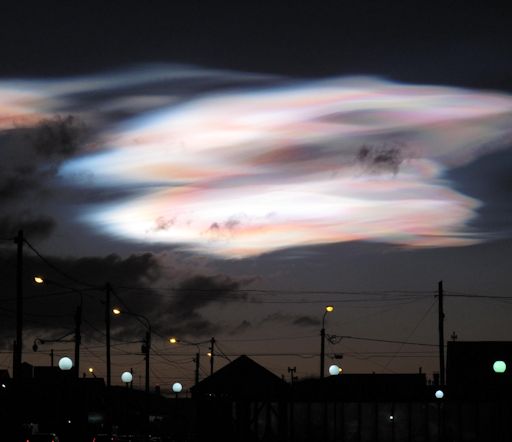
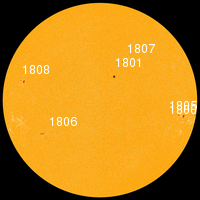
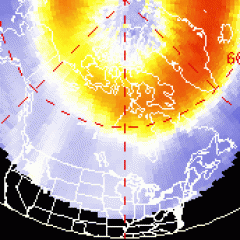
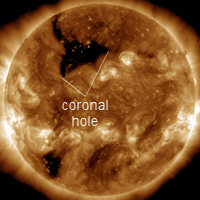

Comments
Space Weather Update....Farside Activity
Is anyone else thinking what I'm thinking? Those "Mother of Pearl" clouds look suspiciously like cloud ships to me! Especially the one on top. Any comments?